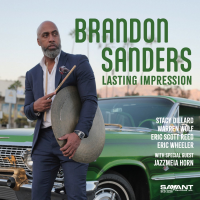Home » Jazz Articles » Interview » A Fireside Chat with Joe La Barbera
A Fireside Chat with Joe La Barbera
One thing that always strikes me with Bill is that his improvisations are almost completely clich
—Joe La Barbera on Bill Evans
 Familiarity breeds a docile apathy. And certainly the temperamental constitution of Tinseltown commits to one constant - inconsistency. But not among those in the arena. Bona fide heroes of the Los Angeles standard like Joe La Barbera (unedited and in his own words), who elevate the routine to an art. Perhaps spectators ought to be beholden to that kind of loyalty and celebrate our local stock as much as the visiting nationally lauded.
Familiarity breeds a docile apathy. And certainly the temperamental constitution of Tinseltown commits to one constant - inconsistency. But not among those in the arena. Bona fide heroes of the Los Angeles standard like Joe La Barbera (unedited and in his own words), who elevate the routine to an art. Perhaps spectators ought to be beholden to that kind of loyalty and celebrate our local stock as much as the visiting nationally lauded. All About Jazz: Let's start from the beginning.
Joe La Barbera: My father was a musician. He had bands his whole life and I think it was his dream to have a family band. I have two older brothers, Pat and John, who are professional jazz musicians as well. So I was pretty much born into it. At a certain point, as kids will do, we rebelled, but then we discovered the beauty of jazz by Lester Young and Jo Jones and from that point on, we were hooked.
AAJ: Pat plays tenor, John, trumpet, was your father a pianist, because then your father has his family band.
JL: He played everything. He played all the instruments and taught all of us on our various instruments.
AAJ: The adolescence of youth indulges rebellion, but when did you reconsider life as a musician?
JL: Very early, Fred. My brother brought the first, modern jazz records home. It just took hold then. From the age of twelve on, my course was set. I knew it was something that I wanted to do and I was not going to be talked out of it. I think you almost have to have that attitude if you're going to survive in this business.
AAJ: When did you join Woody Herman?
JL: I got out of the service and joined Woody Herman's band in 1971. We were on the road year round. It was a great experience. I feel blessed to have been part of that organization with Woody still at the helm.
AAJ: Herman certainly had the ear for players.
JL: It's true, Fred. That was Woody's gift. He was always able to recognize the potential in the player and equally, he would also recognize if someone wouldn't cut it and you would be gone in a second. He just had an ear for that kind of thing and was willing to put up with whatever amount of time it took for someone to grow into their spot. He was ready to let you find it on your own.
AAJ: Joining the Herd is the deep end of the pool.
JL: It was great to travel. It was great to be with a band that I always wanted to play with. From the time we were kids, Woody's band was the one we all wanted to be on. Once I was on board, I just felt like I was part of a legacy that is very important to jazz. And anybody who has been through Woody's band will tell you the same thing. The list just goes on and on. It is hard to go into a rehearsal band or a professional situation anywhere in this town and not see somebody that wasn't on one of the Herd.
AAJ: And from Herd to Chuck Mangione.
JL: I went to Chuck Mangione's band for a period of five years. That was equally interesting. It started out as being a small bebop band.
AAJ: Had Mangione's popularity peaked?
JL: No, I have to say, I have a tendency to leave people at the right time, right before they go onto huge success (laughing). Chuck was experiencing moderate success. When I joined him, he had just signed with Mercury and that evolved into a deal with A&M, which brought us to California and that part of the experience crucial in my life because I started to really dig coming out West. It put a little bug in my head about possibly one day coming out here and checking it out.
AAJ: And the evolution of your association with the Bill Evans Trio?
JL: I was just really fortunate. My first gig when I got to New York was a week with Jim Hall at Sweet Basil. I worked locally for about two years with everybody - Art Farmer, Art Pepper, Bob Brookmeyer, the Brecker Brothers, Scofield. Bill was looking for a drummer and he and his manager came by to check me out at a club where I was playing and then called and asked me to come down as audition for his trio.
AAJ: Bill Evans is widely known among musicians as being gentle and generous.
JL: Well, I agree with your assessment of Bill because it is absolutely true. He was very generous and a very warm, down to earth human being. No doubt, he was a genius. No doubt, his ability was far above almost everybody out there that played jazz piano. But his ego was in check. He fully understood and realized what it was he had and he didn't need to go around rubbing your nose in it. On a personal level, we could relate on several different levels. We were both Boy Scouts. We both had served in the military and liked various sports. At one level, he was just an average person. On another level, he was just so superior as a musician, it was awesome to be on the bandstand with him.
AAJ: How did Bill Evans refine the landscape of jazz piano?
JL: If you listen to the way jazz piano players were playing prior to Bill - Red Garland and Wynton Kelly - great piano players, but the style jazz piano players were using prior to Bill Evans coming on the scene and listen to the way they're playing after he came on the scene and it speaks for itself. He changed forever the way the piano was approached. He opened up so many different possibilities in terms of harmony and rhythm. One thing that always strikes me with Bill is that his improvisations are almost completely cliché free. It always had that creative level. You don't hear him just going through licks. He was creating all the time.
AAJ: How did Jazz Compass form?
JL: By being rejected by all the labels that I presented my projects to. It used to bother me, but I remember reading an article about McCoy Tyner and after he left Coltrane, he couldn't get a deal. I don't think Horace Silver has a deal with a label right now. How could I feel bad? I just decided that I was not going to waste my time anymore. Myself, Tom Warrington, Larry Koonse, Clay Jenkins, we just decided to stop complaining and do something and that is what we did.
 AAJ: And your latest is Mark Time.
AAJ: And your latest is Mark Time.
JL: Someone like Clay Jenkins is such a unique performer. Bob Sheppard can play anything you put in front of him and make it happen. Bill Cunliffe is equally as broad in his experience and his ability to take anything and make it happen on the bandstand. Tom Warrington, my favorite bassist by far because we've played so much together over the last fifteen years. That band has been together over ten years.
AAJ: It speaks volumes about Joe La Barbera that you are on the bandstand on any given day in any given setting.
JL: You're right. I do get more than my share of work in town. I think what pleases me the most is that so many people enjoy having me on the bandstand with them. That to me is the highest compliment that anyone can ever give me.
Tags
PREVIOUS / NEXT
Joe La Barbera Concerts
Support All About Jazz
 All About Jazz has been a pillar of jazz since 1995, championing it as an art form and, more importantly, supporting the musicians who make it. Our enduring commitment has made "AAJ" one of the most culturally important websites of its kind, read by hundreds of thousands of fans, musicians and industry figures every month.
All About Jazz has been a pillar of jazz since 1995, championing it as an art form and, more importantly, supporting the musicians who make it. Our enduring commitment has made "AAJ" one of the most culturally important websites of its kind, read by hundreds of thousands of fans, musicians and industry figures every month.

























